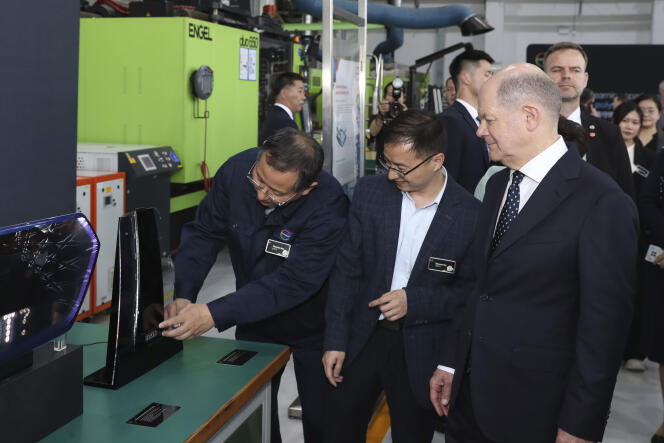For Olaf Scholz, China remains Germany’s privileged partner


Olaf Scholz’s visit to China, from Sunday April 14 to Tuesday April 16, was very similar to the state visits that characterized the period of great economic cooperation. A sign that the German chancellor does not see this as over, in a context where Europe is now concerned both about the scale of Chinese exports and the proximity between Beijing and Moscow.
With two days devoted to economics and dialogue with students on less controversial topics, and one day devoted to more complex political issues, his visit program reflected a German strategy more open to exchanges with China than even the current European Commission. or an ally of America.
The German head of government landed in Chongqing, a vertical metropolis on the banks of the Yangtze River, on Sunday, where he toured a Bosch hydrogen engine factory, then toured the impressive megacity with young architects before taking a tour of the river. The next day, in Shanghai, the country’s most populous and international city, he visited the German group Covestro’s polymer plant before being admitted to Tongji University. It was there that he presented his approach to China. The social-democratic chancellor spoke about the difficulties for Western companies to access the Chinese market. “One thing is clear, the competition must be fair”, she said. But it also seemed to put into perspective China’s risk to European industries, which implied the fear of Japanese automobiles in the 1980s. “There was a great stir in the newspapers: now the Japanese cars are coming and they will crush us”He noted that business with China guarantees many jobs in Germany.
The discussion on the problem of China’s industrial overcapacity in any case turns into a deaf dialogue. Discussed with the secretary of the Communist Party of Chongqing, it was dismissed by the Chinese side as fake news, Bloomberg reported.
“A just peace in Ukraine”
The German Chancellor raised the issue of Taiwan and warned that “Borders should not be changed by force”. But his approach to human rights could not be more cautious. He asked the students to exchange more and “Free, open conversation”. “The best, of course, is to be able to express your opinion freely”, claimed the German leader. A rare hint of a regime shutdown during his visit to a country where rights are severely violated.
Source: Le Monde
Leave a Reply